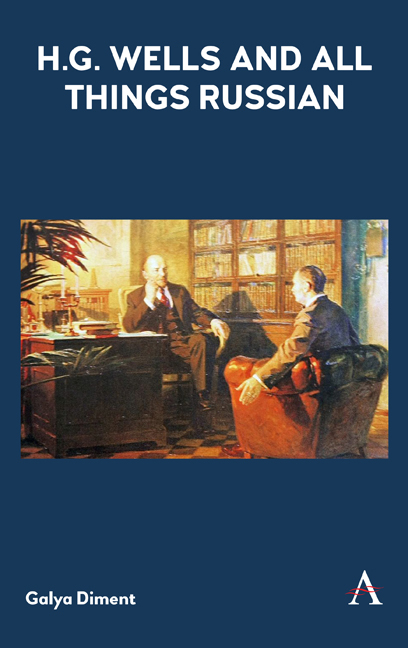Book contents
- Frontmatter
- Dedication
- Contents
- List of Illustrations
- Acknowledgments
- List of Contributors
- A Note on Transliteration
- Introduction: “The Wells Effect”
- Part One WELLS IN RUSSIA: PRE-WORLD WAR II
- Part Two WELLS IN RUSSIA: POST-WORLD WAR II
- Chapter Four “Unregenerate Mass Nature” in H. G. Wells and the Brothers Strugatsky
- Chapter Five Culturology: Yuly Kagarlitsky's Life of Wells
- Chapter Six “Come and Visit Us in Ten Years’ Time!”: Representation of H. G. Wells on the Russian Stage and Screen
- Part Three RUSSIA IN WELLS
- APPENDIX TRANSLATIONS
- Bibliography
- Wells, Herbert George – Works Index
- General Index
Chapter Four - “Unregenerate Mass Nature” in H. G. Wells and the Brothers Strugatsky
from Part Two - WELLS IN RUSSIA: POST-WORLD WAR II
Published online by Cambridge University Press: 06 September 2019
- Frontmatter
- Dedication
- Contents
- List of Illustrations
- Acknowledgments
- List of Contributors
- A Note on Transliteration
- Introduction: “The Wells Effect”
- Part One WELLS IN RUSSIA: PRE-WORLD WAR II
- Part Two WELLS IN RUSSIA: POST-WORLD WAR II
- Chapter Four “Unregenerate Mass Nature” in H. G. Wells and the Brothers Strugatsky
- Chapter Five Culturology: Yuly Kagarlitsky's Life of Wells
- Chapter Six “Come and Visit Us in Ten Years’ Time!”: Representation of H. G. Wells on the Russian Stage and Screen
- Part Three RUSSIA IN WELLS
- APPENDIX TRANSLATIONS
- Bibliography
- Wells, Herbert George – Works Index
- General Index
Summary
Anybody at all familiar with Russian science fantasy (nauchnaia fantastika, nf) of the twentieth century knows very well the figures of Arkady (1925– 1991) and Boris Strugatsky (1933– 2012). Brothers working collaboratively on most of their works, they completely dominated the genre in the Soviet Union from the early 1960s until the nation's collapse and contemporaneous death of Arkady. Of course, their fame and popularity did not end in 1991, and they continue to be regarded as the “leading authorities and models” for new writers in the genre, both through their writings and through the prestigious “ABS-prize” for fantastic literature that has been awarded yearly since 1999 (ABS is an acronym of the brothers’ combined name). Given the Strugatskys’ stature, it is also partly through his influence on their oeuvre that English science fiction (sf) writer H. G. Wells has made his greatest impact on Russian nf since the 1960s (in addition to his earlier, more direct impact before then). One of the most telling statements that speaks to Wells's prestige comes from Boris Strugatsky himself. In his 1995 list of “The Golden Ten” of nf, he proposed a kind of minimal basic canon of classics that have had “profound— direct or indirect— influence on 20th century nf in the world and in Russia in particular.” H. G. Wells's dominance in the genre can be gleaned from the fact that even this minimal canonical list contains both his books The Time Machine (1895) and The War of the Worlds (1897). A similar valuation appears in an essay on Wells by the seminal scholar of sf in the West, Darko Suvin, who states, “all subsequent significant SF can be said to have sprung from Wells’ Time Machine.” As such, it comes as no surprise that even a critical reader like Suvin would rank as “significant SF” several of the Strugatskys’ fictions, given the debt they owe to Wells's scientific romances.
It is not for nothing that Wells is commonly considered the father of sf, so even the insignificant— as Suvin might categorize them— examples of the genre have followed in Wells's footsteps. Wells's widely popular scientific romances inspired in Russia and the Soviet Union many frivolous imitations as well as serious works that further developed the themes he introduced.
- Type
- Chapter
- Information
- H. G. Wells and All Things Russian , pp. 81 - 100Publisher: Anthem PressPrint publication year: 2019



